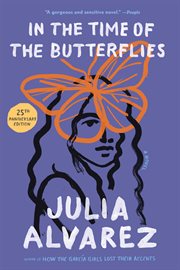Review by Booklist Review
Alvarez follows her charming first novel, How the Garcia Girls Lost Their Accents (1991), with a broader, deeper, and even more affecting second one. It's a true story drawn from the history of her native Dominican Republic, about the Mirabel sisters, who, along with their husbands, were instrumental in the formation of an underground resistance movement against the dictatorship of Rafael Leonidas Trujillo. What Alvarez achievesso effortlessly and splendidly, with controlled emotion and resonant detailis a novel with a beautifully balanced sense of domestic as well as political drama. She portrays the sisters as they grow from girls into women and follows their paths from school, boys, marriage, and children to even greaterlife-and-deathconcerns. Her novel is a statement about politics and history told in very human terms and, as importantly, told not with outrage, but with self-possession. Certain to be a hit. (Reviewed July 1994)1565120388Brad Hooper
From Booklist, Copyright (c) American Library Association. Used with permission.
Review by Publisher's Weekly Review
During the last days of the Trujillo dictatorship in the Dominican Republic, three young women, members of a conservative, pious Catholic family, who had become committed to the revolutionary overthrow of the regime, were ambushed and assassinated as they drove back from visiting their jailed husbands. Thus martyred, the Mirabal sisters have become mythical figures in their country, where they are known as las mariposas (the butterflies), from their underground code names. Herself a native of the Dominican Republic, Alvarez ( How the Garcia Girls Lost Their Accents ) has fictionalized their story in a narrative that starts slowly but builds to a gripping intensity. Each of the girls--Patria, Minerva and Maria Terese (Mate) Mirabal--speaks in her own voice, beginning in their girlhood in the 1940s; their surviving sister, Dede, frames the narrative with her own tale of suffering and dedication to their memory. To differentiate their personalities and the ways they came to acquire revolutionary fervor, Alvarez takes the risk of describing their early lives in leisurely detail, somewhat slowing the narrative momentum. In particular, the giddy, childish diary entries of Mate, the youngest, may seem irritatingly mundane at first, but in time Mate's heroism becomes the most moving of all, as the sisters endure the arrests of their husbands, their own imprisonment and the inexorable progress of Trujillo's revenge. Alvarez captures the terrorized atmosphere of a police state, in which people live under the sword of terrible fear and atrocities cannot be acknowledged. As the sisters' energetic fervor turns to anguish, Alvarez conveys their courage and their desperation, and the full import of their tragedy. 40,000 first printing; $40,000 ad/promo; reprint rights to NAL; 20-city author tour. (c) Copyright PWxyz, LLC. All rights reserved
(c) Copyright PWxyz, LLC. All rights reserved
Review by Library Journal Review
Alvarez's award-winning first novel (How the Garcia Girls Lost Their Accents, LJ 5/1/91) is more than matched by her second. Butterflies is based on the lives of the four Mirabel sisters (code name: "Mariposas," that is, butterflies), three of whom were martyred in 1960 during the liberation of the Dominican Republic from the dictator Trujillo. Through the surviving sister, Dede, as well as memories of Minerva, Patria, and Maria Teresa, we discover the compelling forces behind each sister's role in the struggle for freedom. As Alvarez says "A novel is not, after all, a historical document, but a way to travel through the human heart." Though murder, torture, and imprisonment are ever-present, she wisely choses to focus on the personal lives of these young wives and mothers, full of love, beauty, and, especially, hope. Highly recommended for its luminescence and relevance.-Rebecca S. Kelm, Northern Kentucky Univ. Lib., Highland Heights(c) Copyright 2010. Library Journals LLC, a wholly owned subsidiary of Media Source, Inc. No redistribution permitted.
(c) Copyright Library Journals LLC, a wholly owned subsidiary of Media Source, Inc. No redistribution permitted.
Review by Kirkus Book Review
Brimming with warmth and vitality, this new novel by the author of How the Garcia Girls Lost Their Accents (1991) is a paean to the power of female courage. The butterflies are four smart and lovely Dominican sisters growing up during Trujillo's despotic regime. While her parents try desperately to cling to their imagined island of security in a swelling sea of fear and intimidation, Minerva Mirabal -- the sharpest and boldest of the daughters, born with a fierce will to fight injustice -- jumps headfirst into the revolutionary tide. Her sisters come upon their courage more gradually, through a passionate, protective love of family or through the sheer impossibility of closing their eyes to the horrors around them. Together, their bravery and determination meld into a seemingly insurmountable force, making Trujillo, for all his power, appear a puny adversary. Alvarez writes beautifully, whether creating the ten-year-old Maria Teresa's charming diary entries or describing Minerva's trip home after her first unsettling confrontation with Trujillo: ""As the road darkened, the beams of our headlights filled with hundreds of blinded moths. Where they hit the windshield, they left blurry marks, until it seemed like I was looking at the world through a curtain of tears."" If the Mirabal sisters are iron-winged butterflies, their men -- father and husbands -- often resemble those blinded moths, feeble and fallible. Still, the women view them with kind, forgiving eyes, and though there's no question of which sex is being celebrated here, a sweet and accepting spirit toward frailty, if not human cruelty, prevails. This is not Garcia Márquez or Allende territory (no green hair or floating bodies); Alvarez's voice is her own, grounded in realism yet alive with the magic of everyday human beings who summon extraordinary courage and determination to fight for their beliefs. As mesmerizing as the Mirabal sisters themselves. Copyright ©Kirkus Reviews, used with permission.
Copyright (c) Kirkus Reviews, used with permission.

